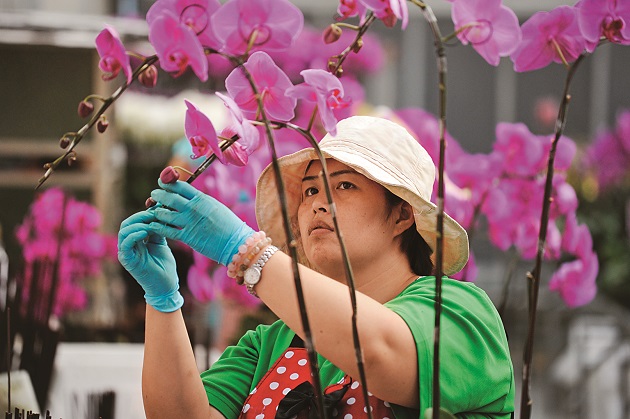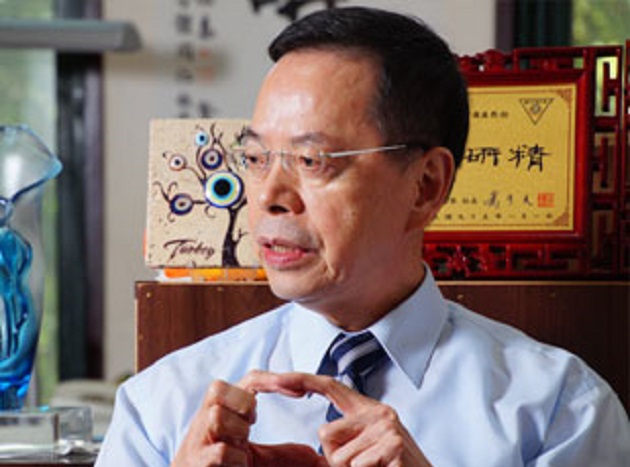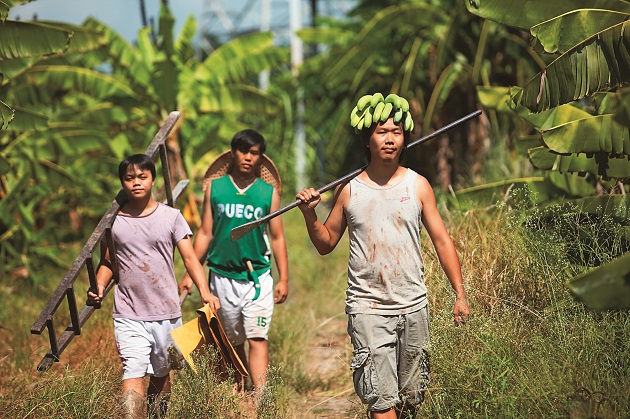Agriculture Ministers Match Wits
Should the Government Take the Lead with Marketing?

Source:CW
The current minister of the Council of Agriculture and a former CoA minister have widely divergent views on Taiwan's agricultural development strategy.
Views
Should the Government Take the Lead with Marketing?
By Kuo-chen Lu, Yen-ling Cheng, Cheng-hsienFrom CommonWealth Magazine (vol. 578 )
CommonWealth Magazine conducted interviews with the current Minister of the Council of Agriculture, Chen Bao-ji, and Lee Chin-lung, who formerly headed the CoA and was responsible for drafting of current presidential candidate Tsai Ing-wen's Agricultural Policy White Paper. From the lost banana kingdom to the blooming orchid industry, they examined the difficulties and solutions Taiwanese agriculture faces under the global competitive environment.
CommonWealth: Critical issue number one for Taiwanese agriculture is the precipitous decline of exports by Taiwan – once known as the "banana kingdom" – from occupying 80 percent of the Japanese market to now less than one percent. What hope is there for Taiwanese bananas in the future?
Chen Bao-ji:
International competition is overwhelming; change is the only way out.
I'm from Chaozhou in Pingtung County, and I was raised on bananas. So seeing (the banana industry) in this state saddens me. Back in the 1950s and '60s, Taiwan maintained good relations with Japan, and there was no other competition to speak of. However, the competition for agricultural products on the international market is dynamic, not static.
Why did this decline take place? First of all, we failed to make substantive advancements at the right time. Second, international competition is quite strong. Once markets opened up, the competitiveness of Taiwanese agricultural products could not compare to that of the past. The same is true domestically, and now we do not discount the possibility of importing bananas in the future.
Agricultural products like bananas must emphasize new production techniques, new approaches, and new sales methods. Young consumers today are used to purchasing two bananas, rather than a whole bunch at once, which shows how consumer models have changed. If you do not adapt and improve your methods, you end up losing out to Philippine bananas.
The Taiwanese banana sector must get back to the finest quality fruit and develop alternate approaches. There is also the large boost in tourism to Taiwan and the corresponding increase in the consumption of agricultural products to consider.
Lee Chin-lung:
It's too late for bananas – we should develop new products to recover the market.
I do not believe that the rise and fall of banana exports is directly connected to the changes engendered by trade liberalization. Even if the Fruit Marketing Cooperative is still in charge of overseas marketing and sales, no growth will result.
 Lee Chin-lung, former Council of Agriculture minister and the main brains behind the formulation of Tsai Ing-wen’s agricultural policy, describes Taiwanese agriculture as strong in production and weak at marketing. He feels the government should lead the way and set up an international marketing company to promote local agriculture.
Lee Chin-lung, former Council of Agriculture minister and the main brains behind the formulation of Tsai Ing-wen’s agricultural policy, describes Taiwanese agriculture as strong in production and weak at marketing. He feels the government should lead the way and set up an international marketing company to promote local agriculture.
The rise and fall of different industries is a natural phenomenon. The decline of Taiwan's banana industry is inextricably linked to societal development. First, the number of farmers is dwindling. Second, land is increasingly scarce. So the low production volume results in diminished competitiveness on the Japanese market.
From now on there won't be many opportunities for Taiwan to make money through banana exports, but we have other things to take its place.
CW: Critical issue number two for Taiwanese agriculture is the lack of integration, as well as cutthroat competition among exporters, with such problems spanning from bananas to atemoyas. In your view, is it possible for a marketing management firm akin to New Zealand's Zespri to emerge in Taiwan?
Chen:
The government isn't omnipotent; young farmers need to consolidate on their own volition.
Export sales and marketing merchants are integrated across the globe. The United States sells products to us through its export association, and the same applies to Japan as well. (Trade) liberalization is impossible for vendors to achieve alone.
Taiwan's strong emphasis on fighting as individual units has resulted in ills throughout the entire production chain. Our farmers have not reached the level of maturity of Zespri's; we should look for young farmers to proceed with integration on their own, and then we'll go ahead and offer assistance. We'll let them do their thing, and help in any way we can. The young farmers we help develop through agricultural associations, production and marketing training courses, or via production facilities will serve as our seeds for the future.
I'll give you an example. Of the 200,000 cases of grapes sold by Changhua's Ta Tsun each year, 150,000 cases are sold online and through group purchases. This represents changes afoot in the entire sales structure.
Governments are always the least creative and least flexible of organizations. Why place expectations on the government to lead young people?
The government should not become an all-powerful entity; instead, industry should look for ways to develop. The government can establish the ground rules, but not step in and lay down restrictions at every turn, getting involved in this and that.
Lee:
Taiwan's marketing is too weak. The government should take the lead.
What international conglomerates like Dole have is capital, and nothing more. First, they have exploited the Philippines' cheap land and labor, and the surplus production volume is such that they can dominate the market and enjoy global competitiveness. Second, they have excellent marketing people. In contrast, we Taiwanese are especially weak at marketing.
 Current Council of Agriculture Minister Chen Bao-ji advocates lending assistance to help young farmers integrate across their field so they can find their own way. He opposes the government getting involved in another large trade merchant program.
Current Council of Agriculture Minister Chen Bao-ji advocates lending assistance to help young farmers integrate across their field so they can find their own way. He opposes the government getting involved in another large trade merchant program.
Taiwan's own Fruit Marketing Cooperative was at one time similar to New Zealand's Zespri. Strictly speaking, New Zealand's approach to exports violates the spirit of WTO (World Trade Organization) trade regulations, as it acts as a monopolistic cartel.
Corporations can operate marketing companies, and so can farmers' groups. Farmers' groups can set up companies to sell and promote agricultural products, so what is stopping them from engaging in distribution and sales? The equipment and facilities is the easy part; the main issue is whether the government will step up and manage it.
CW: Critical issue number three for Taiwanese agriculture is that agricultural production and marketing companies established by Taiwan's five major municipalities, including Taipei and Kaohsiung, actually import agricultural goods from abroad, selling apples from Japan and pears from Korea. Meanwhile, local agricultural associations have devolved into political campaign tools, or are used to lend or absorb capital. So should agricultural associations reform?
Chen:
There's nothing peculiar about importing fruit. What is important is changing in line with the market.
We should look at agricultural associations in terms of what they can do for us, rather than obsessing over what they should not be doing. For instance, do you really think it's possible for a fruit seller to sell Taiwanese fruit exclusively? No, it isn't. This is true whether we're talking about fruit stands in traditional markets or on the street corner.
Agricultural associations have their worth, but if they do not conform to our development needs they must change. The agricultural associations of Wantan in Pingtung and Tashu in Kaohsiung are two examples of successful transitions. Unless they adapt and transform, agricultural associations are quite likely to be supplanted. Every system undergoes a transformation every two or three decades. You needn't fight it, and what's more, such transformation is good for the future development of young people.
Lee:
Agricultural associations are shams we can do without.
We could do without agricultural associations. They exist and operate under false pretenses. Agricultural sales and marketing firms associated with agricultural associations were ostensibly set up to help Taiwanese farmers with marketing, yet now they are doing precisely the opposite. That's unacceptable.
 Wang Chi-wei (first on right), founder and keyboard player of Youth Banana, a rock group based in Kaohsiung, tries to link banana production with local culture, community building, immersive tourism, and cultural-creative products.
Wang Chi-wei (first on right), founder and keyboard player of Youth Banana, a rock group based in Kaohsiung, tries to link banana production with local culture, community building, immersive tourism, and cultural-creative products.
Government regulation of agricultural associations should guide them onto the straight and narrow, which means helping farmers make money, not purchasing foreign goods to offer to local consumers and compete with Taiwanese farmers at home. The main function of agricultural associations is to promote agriculture, but they have lost sight of that role these days.
CW: Critical issue number four for Taiwanese agriculture is, should the government lead the way and set up an international marketing company to promote local agriculture?
Chen:
Just try it yourself and see. The government should let go.
Just do it yourself and see what happens. Don't start up an international marketing company just because you see Yu-jan Chen doing it (editor's note: Chen is the former global president of sales and marketing for Zespri).
What about agricultural association integration? We work on supporting and cultivating young famers so they can go out and do what's most profitable, not so the government can step in and set up a marketing firm.
We set up a lot of those in the past, and now they're all dead. I'm not criticizing her (Tsai Ing-wen), I'm just saying to give it a shot yourself. That's how a lot of big trading firms collapsed in the past.
Lee:
Use the government's leverage to establish an international brand.
I participated in the formulation of Tsai Ing-wen's agricultural policy –all my views are in there. The point of an international marketing company is to help establish an international brand (for Taiwan).
Taiwanese agriculture is characterized by its strong production and weak marketing, so we look to strengthen the marketing part. If agricultural associations are still comatose, we'll just go ahead and establish an international agricultural marketing and promotion company. It doesn't have to be a central government operation – local is also acceptable – it depends on the body's mission, and who runs and operates it.
CW: Critical issue number five for Taiwanese agriculture is that agriculture has long been a subsidy pool. So how can Taiwan respond to international competition?
Chen:
I will never give out subsidies. Innovation and change are the only ways to ensure a decent future.
In the future, basic foodstuffs will not be the chief consideration driving Taiwanese agriculture; rather, it will become an industry that can be profitable and run as a business.
Take edamame, for instance. In addition to exporting the whole bean to Japan, now people are exporting soup made from powdered edamame beans. So you can see how products evolve and change. Which is exactly what international competitiveness requires; you have to create new and unique value.
Did you know how we're exporting mangoes? Taiwan is selling bricks made from freshly harvested frozen mangoes to Japan. That's creativity and transformation for you.
What direction should Taiwanese agriculture move in?
At each step you have to think of ways to create wealth for agricultural villages. The export of every type of agricultural product must be planned out; you have to deliberately seek out your market, not just sell your leftovers. That is no way to run a good brand, just as reliance on political obligations destroyed the reputation of Taiwanese bananas.
Lee:
Forget about competitiveness without international marketing experts.
For me the idea would be for Taiwan to produce tropical fruit for sale to temperate regions. We have the right climate for that. Taiwan is like a giant greenhouse, so what's stopping us from doing so?
Despite improvements to crop varieties and technological advances, marketing is always the worst performer. As long as the marketing can improve, we'll be just fine.
We can make breakthroughs via education. The Netherlands is a small country with a smaller population than Taiwan, but Dutch people are accustomed to speaking at least four languages (Dutch, German, English and French) from a young age. A small country cannot exist alone. It must engage in trade, and when you do business with others you need to speak their language. Taiwan's competitiveness could stand improvement. It depends on whether you go ahead and do something yourself, and where you place your efforts.
Translated from the Chinese by David Toman






